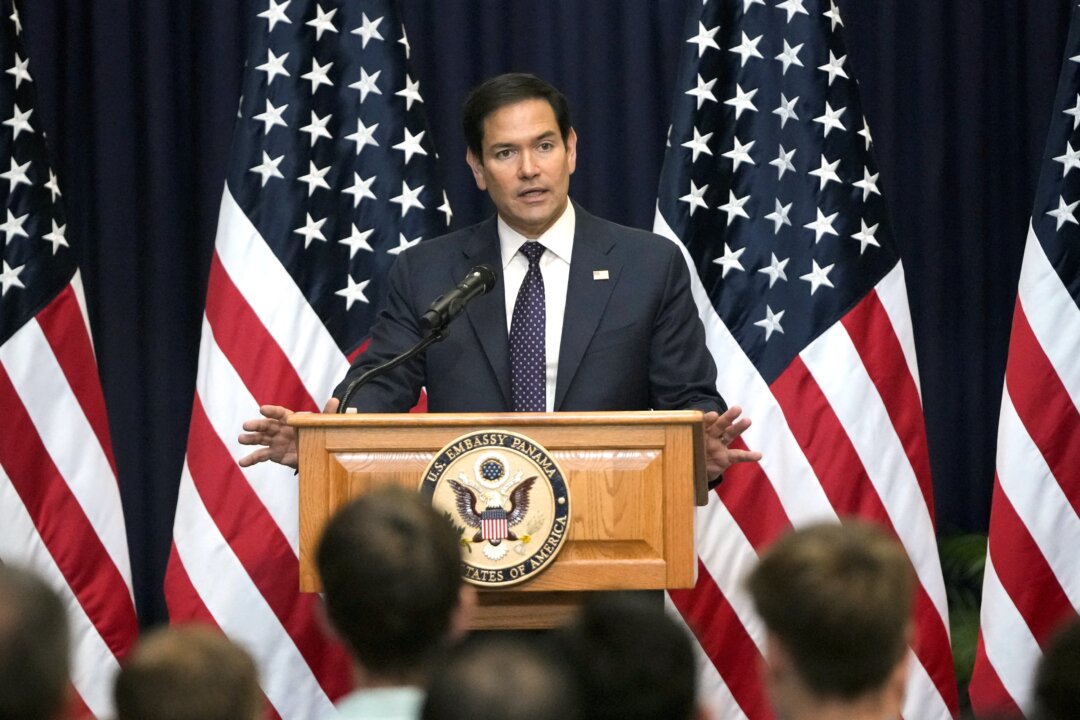Secretary of State Marco Rubio held talks with Panama’s president during the first stop of his tour of Latin America as the top U.S. diplomat.
U.S. Secretary of State Marco Rubio has applauded Panama for choosing not to renew a trade and infrastructure development agreement with China, calling the decision “a great step forward” for the country’s relationship with the United States.
Rubio is on a six-day trip to Panama, El Salvador, Costa Rica, Guatemala, and the Dominican Republic, marking his official overseas travel as the top U.S. diplomat under President Donald Trump. The State Department said Rubio would advance Trump’s America First foreign policy during his trip, which ends on Feb. 6.
After holding talks with Rubio, Panamanian President Jose Raul Mulino said on Feb. 2 that his country would not renew its participation in Beijing’s Belt and Road Initiative (BRI), also known as “One Belt, One Road.” Mulino said the agreement was set to expire in two to three years but could be terminated sooner.
Washington and critics have criticized the Chinese Communist Party (CCP) for luring countries into the initiative in an effort to expand its global influence through “debt trap diplomacy.”
“Yesterday’s announcement by President [Jose Raul Mulino] that Panama will allow its participation in the CCP’s Belt and Road Initiative to expire is a great step forward for U.S.–Panama relations, a free Panama Canal, and another example of [Trump’s] leadership to protect our national security and deliver prosperity for the American people,” Rubio wrote on social media platform X on Feb. 3 after departing Panama.
Panama joined the BRI in November 2017, becoming the first Latin American country to officially sign up for the infrastructure projects. Five months earlier, Panama shifted its diplomatic relationship from Taiwan to China.
The Chinese regime launched the BRI in 2013 with the aim of building Beijing-centered land and maritime trade networks by financing infrastructure projects throughout Southeast Asia, Africa, Europe, and Latin America.
Many lawmakers welcomed Panama’s decision not to renew its BRI agreement with China.
“This is a shift in the right direction, and I hope more countries will prioritize partnerships with the U.S. and recognize the risks of China’s influence,” Rep. John Moolenaar (R-Mich.), chairman of the House Select Committee on the Chinese Communist Party, said in a statement on Feb. 3.
Rep. Michael McCaul (R-Texas), former chair of the House Foreign Affairs Committee, called Panama’s decision “a tremendous victory” for the United States and “the Panamanian people who are escaping the CCP’s debt trap diplomacy,” according to a statement.Rubio’s trip to Panama highlights Trump’s insistence on retaking the Panama Canal, asserting that Panama has broken a pledge of neutrality because of the Chinese regime’s influence over the waterway.
The pledge, officially called the Neutrality Treaty, stipulates that the United States may use its military force to protect the Panama Canal from any threat to its neutrality, essentially allowing the United States to perpetually use the waterway.
The Panama Canal, which opened in 1914 after 10 years of construction by the United States, was returned to Panama under a 1977 deal signed by President Jimmy Carter. The 1977 deal consists of the Neutrality Treaty and the Panama Canal Treaty.
Hong Kong-based CK Hutchison Holdings operates the Balboa port on the Pacific side and the Cristóbal port at the Atlantic entrance of the canal. Two Chinese state-owned firms are currently building a fourth bridge over the canal.
“China is running the Panama Canal that was not given to China, that was given to Panama foolishly. But they violated the agreement, and we’re going to take it back, or something very powerful is going to happen,” Trump told reporters on Feb. 2.
Trump said on Feb. 3 that he was scheduled to talk to Panama officials on Feb. 7.
The U.S. State Department said on Feb. 2 that Rubio had passed on a message from Trump that China’s presence in Panama posed a threat to the canal and violated the treaty.
Following discussions with Rubio, Mulino indicated that, subject to the results of an audit, he would be open to reviewing the 25-year concession granted to CK Hutchison Holdings for the operation of the two ports.
The Panama Maritime Authority announced the audit of CK Hutchison Holdings on Jan. 20.
Ryan Berg, director of the Americas program at the think tank the Center for Strategic and International Studies, said the audit could provide a way to undo the concessions if there is corruption in the deal.
“That provides more legal framework for Panama to wiggle out of the concessions and for Panama to reopen them such that an American company or a European company might come in and win the bid,” Berg said.
Reuters contributed to this report.

